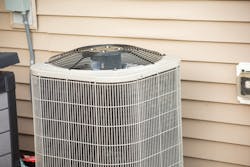Heat Concerns Trip Up New GFCI Requirement in 2020 NEC
As temperatures heat up across the country, efforts by states, homebuilders, HVAC contractors, and others to sidestep a 2020 National Electrical Code (NEC) requirement linked to worrisome cases of repeated tripping of GFCI breakers on newly installed HVAC units have been following suit.
Of concern is Sec. 210.8(F), new to the 2020 Code, which extends GFCI protection to outdoor outlet components of air-conditioning and heat pump systems and other equipment supplied by single-phase branch circuits rated 150V to ground or less, 50A or less. The impetus for the extension of GFCI protection to such equipment came largely from the 2007 electrocution death of a 12-year-old boy who jumped a fence and contacted an A/C condenser unit that had an electrical ground fault to the metal fence.
Beginning last year, some jurisdictions that adopted the 2020 edition of the NEC, or were poised to, discovered the chronic tripping problem, tracing it to GFCI device incompatibility with certain types of HVAC equipment. Reports from builders, contractors, and inspectors of A/C units repeatedly shutting off, robbing homeowners of the ability to reliably control dwelling temperatures, and, in turn, exposing them to health risks as the summer cooling season arrives, have led several bodies to remove, alter, or postpone enforcement of Sec. 210.8(F) in their jurisdictions. To date, however, review committee procedures of The National Fire Protection Association (NFPA), the body that develops NFPA 70 (i.e., the NEC), have rejected proposals to change the Code’s requirement.
One of the first jurisdictions to discover and detail the tripping problem last year was Shelby County, Ala., and its then chief electrical inspector. He was the first to submit a formal Tentative Interim Amendment (TIA) with NFPA in September to address the issue. The TIA, ultimately rejected by NFPA, sought to postpone the effective date of Sec. 210.8(F) until Jan. 1, 2023, citing recent field experience with new installations demonstrating “random opening of the GFCI devices protecting ductless mini splits and (possibly) other (AC) equipment employing power conversion equipment controlling the speed of the compressor.”
Since then, more evidence has accumulated that a range of A/C and heat pump units employing certain control technologies and commonly used in new home construction do not work with GFCI circuit breakers. That prompted several other 2021 TIAs (1589, 1564, and 1593) calling for postponement; some of which were rejected and others the NFPA’s standards committee is slated to consider at its August meeting.
The former Shelby County inspector, Donald Cook, also an NFPA board member, says the GFCI tripping issues that surfaced in Alabama and elsewhere constitute a practical problem that must be weighed against the margin of safety that GFCI protection of the units deliver.
“Putting the requirement in was done for all the right reasons, and the NFPA committee that voted against the TIA said they couldn’t give in on the issue of ground fault protection,” Cook says. “But we couldn’t find a way to correct the tripping problem so homeowners could have both GFCI protection and air conditioning.”
Cook says his TIA sought a middle ground where time could be bought to allow A/C unit and GFCI manufacturers to fix the compatibility problem (a process that’s now begun), and reinstatement of the requirement would happen at a date certain. The TIA argued that “Additional time is necessary for the industry to resolve the operational aspects of these specific types of equipment…Without this TIA, designers, installers, AHJs, and consumers are forced to choose between a compliant and an operational installation.”
For about half of the 11 states that have so far adopted the 2020 NEC, that’s an untenable devil’s bargain. Texas, Massachusetts, South Dakota, and Minnesota are among the states adopting the Code but waiving current enforcement of Sec. 210.8(F). That hasn’t happened in some states like Texas, however, without some spirited debate.
Before voting in May to delay enforcement for at least 120 days, the Texas Department of Licensing & Regulation commission argued the merits among itself and heard input from contractors, builders, and others at a hearing on May 18. The state’s chief electrical inspector, Jerry Daniel, said while he’s a strong proponent of GFCIs, it would be unwise to jeopardize the ability of homeowners to use their air conditioning. “This is one where we jumped the gun, and we should have gotten more testing data,” before including it in the 2020 Code, he stated.
Commissioner Tom Butler made the motion to support the change but voiced concern about continued unchecked shock and electrocution hazards. “I do this with trepidation,” he said. “I’m quite scared. The risk of electrocuting a Texan versus the risk of a Texan dying of too much heat is a tough position to be in, and I don’t like it.”
Commissioner Gerald Callas voted for the exclusion but pushed back against Daniel’s characterization of the tradeoff and an insinuation during discussion that GFCI equipment manufacturers may have influenced adoption of the new requirement.
Authorities in Massachusetts, the first state to adopt the 2020 Code, excluded the requirement after learning of the compatibility problems, opting to wait for results of investigations determining the scope and extent of the problem and possible fixes, says Jim Rogers, owner of Bay State Inspectional Agency, Vineyard Haven, Mass. Rogers, who has previous NFPA Code-making panel membership experience, backs extension of the GFCI requirement, but worries about enforcement under conditions that are operationally challenging and could open the door to new safety worries.
“If something doesn’t work, it’s often human nature to alter something to try to make it work,” he says. “That could present a shock hazard if contractors are motivated to try to get around the GFCI on this equipment themselves.”
That might partly explain the reluctance of NFPA standards and correlating committees to ultimately approve the TIAs that each tried to make a case for action because of the existence of an emergency situation. GFCI protections have expanded and broadened in Code updates over the years, and this newest section addresses an area that has been of particular concern, says NFPA staffer Jeff Sargent, principal electrical specialist. A/C units are a special electrical safety concern, he says, because they are typically infrequently maintained.
“NFPA has looked to improve the level of safety for equipment that’s outside and in a rather tough environment,” he says. “When a unit is installed, that might be the last time people are involved with it, and we know maintenance is not something that occurs on a regular basis. Maybe a company comes out and recharges the unit, but doesn’t look at the electrical safety piece. So, the GFCI becomes the stopgap, sort of like a car airbag.”
Sargent says he understands the dilemma some jurisdictions face with tripping breakers on A/C units and their decisions to void the requirement, especially if they’re in parts of the country where A/C is essential. But he says it wouldn’t be wise to permanently shut the door on requiring GFCI protection on A/C units and other outdoor outlets.
“We don’t like to see amendments that reduce the level of safety, but in cases where there’s a cooling season coming — and there’s concern about units working — state or local amendments may make sense,” he says. “From a safety standpoint, though, it’s right to have this language in the Code.”
Call for Comments
The closing date for making comments on two of the proposed TIAs is July 19. For more information and instructions on submitting a comment, read TIA 1593 and TIA 1589.
About the Author
Tom Zind
Freelance Writer
Zind is a freelance writer based in Lee’s Summit, Mo. He can be reached at [email protected].

